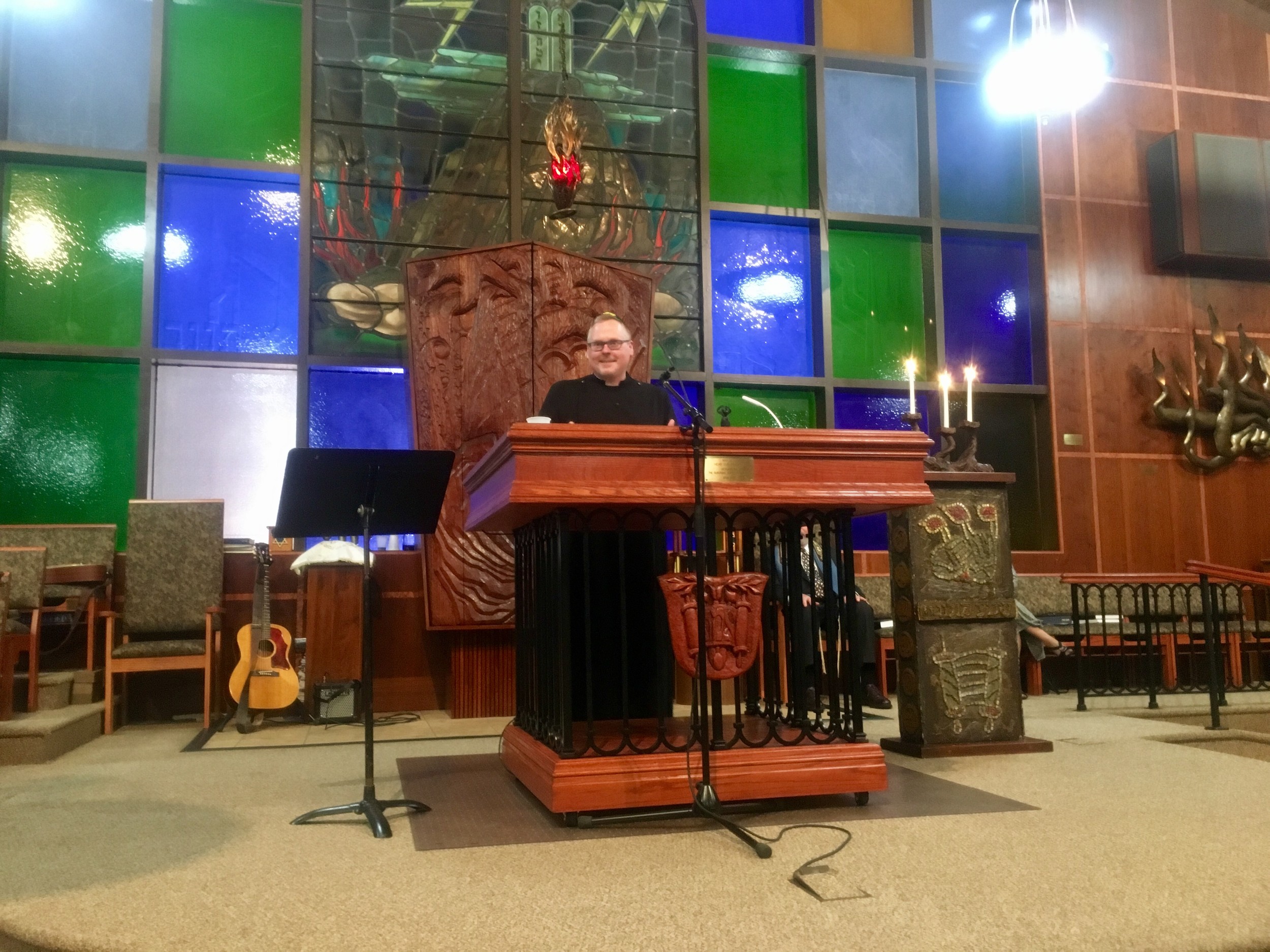Wantagh and Seaford religious leaders unite at Temple B’Nai Torah interfaith Shabbat
Dozens of local folks shyly chimed in when the Rev. Christopher Hofer, the rector of the Church of St. Jude in Wantagh and vicar of St. Michael and All Angels in Seaford, began singing “Won’t You Be My Neighbor?” — the theme song of the television show that Hofer, 46, said taught him about the world — at Temple B’Nai Torah on March 24. Laughter rang out through the synagogue when Hofer began to describe “Mister Rogers’ Neighborhood.”
“Every week, we got to discover another person who was a neighbor,” he said. “He would bring people on his show who didn’t look like him, who didn’t have the same background as him … he would introduce us to the wonders of the world and the joy of creation.”
Hofer said that he took the lessons that Fred Rogers taught him through his Public Broadcasting Corporation show when he began preaching and living in cities around the country. Temple B’Nai Torah leaders invited him to share what he has learned about the importance of diversity and caring for others at the annual Joyce Berger Memorial Interfaith Shabbat.
Temple B’Nai Torah, on Jerusalem Avenue in Wantagh, also has members from surrounding communities such as Seaford, Bellmore, Merrick and East Meadow. Rabbi Howard Nacht said that the warm and welcoming congregation often looks for ways to help and connect with others outside the shul.
Leaders organized the interfaith Shabbat service in honor of Joyce Berger, a past president of the Sisterhood of Temple B’Nai Torah who helped others, Nacht said. Judy Novet, a trustee on both the temple and Sisterhood board, said that these types of services encourage people of different faiths to think about their shared ethics.
“You are recognizing that shared sense of value and culture and morality,” she said. “We are part of a community — a world community and a local community. It is important that we do care for one another and support one another.”
Nacht said that he was proud to welcome Hofer, who he described as passionate about spreading the “unconditional and all-inclusive love of God,” to the temple. In addition to serving St. Jude and St. Michael’s, Hofer is a past president of the Wantagh Clergy Council, an active member of the Southeast Nassau Deanery, a child abuse prevention and anti-racism instructor, and a deputy/alternate to the Episcopal Church’s General Convention.
Hofer said that he did not meet many folks from different ethnic and religious backgrounds while growing up in the Midwest. Temple B’Nai Torah members laughed when he noted that he did not meet a Jewish person until he went away to college at Walsh University in North Canton, Ohio.
Hofer said he met all types of people while studying at the General Theological Seminary of the Episcopal Church in New York City. He was living there on a day that he said changed the way Americans treated their local and global neighbors: Sept. 11, 2001.
Recalling the sight of the twin towers collapsing and the smell that clung to buildings across Manhattan for days after the terrorist attacks, Hofer said that heartbroken and enraged Americans began scapegoating their Muslim neighbors. He remembered the shock of hearing children say, “The only good Muslim is a dead Muslim,” while walking down the street.
Hofer said that some Americans have continued to see Muslims, as well as immigrants and LGBTQ individuals, as “others.” He encouraged people of all faiths to stand up to divisive rhetoric and those who are “scapegoating all of our country’s problems” on people from specific communities.
“We are in an age where people are actually being encourage to view their neighbor not as children of God, but as the enemy — as subhuman,” he said to Temple B’Nai Torah members, pausing before adding, “I do not need to tell you what happens when a society declares individuals subhuman.”
Nacht said that divisiveness is a problem in society today, noting that some political leaders act like bullies. “There are times when I’ve said, ‘There are some people in Washington who ought to take out their Bibles and start reading them again,’” he said.
Like Hofer, Nacht said that he often preaches about the importance of inclusivity. The self-described colleagues and friends encourage their congregations to support each other’s community service work; for instance, Nacht said, Temple B’Nai Torah members gathered donations for the St. Jude Mission Center Mother and Child Ministry to present to Hofer at Shabbat.
One thing that Nacht said he has told his congregants many times is that, in the Torah — the first five books of the Bible — one commandment is repeated over and over: “Welcome the stranger, because you were strangers in the land of Egypt.”
“It doesn’t matter if five generations of our ancestors were born here — the sixth generation back was a stranger here,” he said, “It’s immigrants and strangers who have built this country and its neighborhoods. We cannot forget this.”






